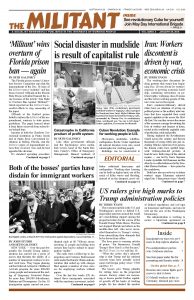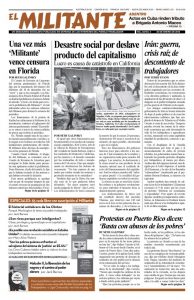Hurricanes, mudslides, wildfires, earthquakes, floods. Under capitalism all natural disasters turn into social catastrophes for working people.
Buildings can be constructed to better withstand hurricanes and earthquakes. Working-class housing can be built on higher land, out of the reach of killer waves and flooding, instead of on the cheapest, most vulnerable land. Millions can be evacuated before a storm hits. But the normal workings of capitalism block every move that impinges on the profits of the property-owning class.
The morality of capitalism is grounded in these class divisions. Dog-eat-dog, look-out-for-number-one, step on who you need to to get what you want — these are the virtues worshipped by the profit-driven ruling families.
Real estate developers build homes near fire-prone terrain. No government body is tasked with responsibility to make sure there is not a dangerous accumulation of flammable vegetation that can act like kindling. When huge fires do break out, as they wreak havoc, they also severely damage the natural water-absorbing capacity of vegetation and top soil. If it rains, mudslides are inevitable. Government officials in Santa Barbara County, Sacramento and Washington all knew this, but did virtually nothing to prepare. Instead, they blame the victims, saying they ignored evacuation orders.
The propertied owners don’t sit in a room and say, “Let’s promote fires and mudslides.” But they gamble with the lives of working people. To the capitalist class, our lives are just a tiny item in their ledgers. They figure the odds. Is the chance of catastrophe small enough to make the risks worthwhile? Can we get away with saying it was a “200-year” storm, nothing could be done?
We see it in the U.S. colony of Puerto Rico where more than three months after Hurricane Maria devastated the island, over a million people are still without electricity. The U.S. rulers — the wealthiest ruling class on earth — are dispensing aid with an eyedropper there, while demanding the colonial government turn its meager resources over to pay the wealthy bondholders who own the island’s debt.
What a difference a revolution makes! In Cuba, as Hurricane Irma approached, the revolutionary people and their government mobilized to evacuate 1.8 million people.
Unlike the “everyone for themself” morality of capitalism, in revolutionary Cuba everything is based on human solidarity, on the belief that human life is more important than money. In the words of Raúl Castro, “no one is left on their own.”
The Cuban people made a deep-going revolution, transforming themselves in the process. They overthrew the Fulgencio Batista dictatorship in 1959 and have stood up to the attacks and indignities of Washington ever since. Under the leadership of Fidel Castro and the July 26 Movement, they used the government — their government — to put human life and dignity ahead of all else and to offer whatever they had to working-class fighters worldwide to open the road to a socialist future.
Working people in the U.S. and around the world can, and will, do the same. If the fight for this kind of future sounds like a good life to you, get in touch with the nearest branch of the Socialist Workers Party.

